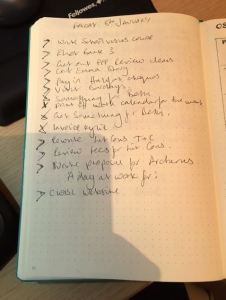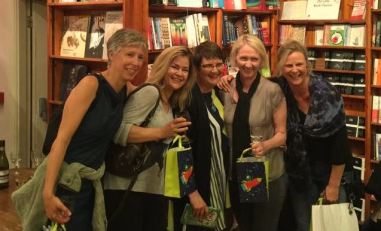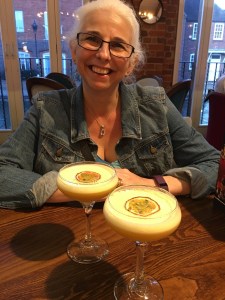New Habit for 2018
I’m known as the organised one among my friends. I’m usually the one who organises a night out. I organise my regular writing critique group. I used to have a job as Project Manager so I guess it’s my natural instinct to be organised. But sometimes my organisation goes wrong. So this year, 2018, I am trying something new. I’m keeping a bullet journal.
Now bullet journalling isn’t new. If you do an internet search you will find all sorts of YouTube videos and Pinterest boards on how to do bullet journalling. You can add fancy patterns, Washi tape, different coloured inks to your spreads … but hang on a minute. Do you know what a bullet journal is?
Bullet Journal
A bullet journal can be all or one of these things :
- A to do List
- A diary/journal
- An appointment calendar
- A planner
And anything else you want it to be.
The idea is to have one notebook where you capture everything you want to achieve and to be organised in an attempt to make you achieve those things.
There are loads of brilliant planners on the market now. Kikki K have a very nice range

Kikki K Swedish Stationers Extrordinaire
And of course Paperchase can be relied on for gorgeous stationery. They have particularly good list pads

Paperchase Lists
But the problem with commercially produced journals and list pads is that they might not have the categories that you require. So you make your own and that’s a bullet journal.
My Bullet Journal
Now I am a complete beginner at bullet journalling and although I am organised, I am also well known for having great ideas and never following them through. But I am into the second week of the year and so far I am still with it.
I’m using a Leuchtturm A5 Bullet Journal with dot grid paper. But before you dash out to buy one, I suggest you buy any notebook with dot grid paper as it wasn’t worth the extra to get the bullet journal version. There are only a couple of extra features that you can put in yourself. I would recommend a Leuchtturm notebook though, because they have numbered pages and space for an index at the front, which are useful features for a bullet journal (as well as for general notebooks).

My new bullet journal
Dot grid paper is useful because you can use the dots to create boxes if you need to and it can accommodate any sized writing.
I started off setting up a year planner

Help! my year looks very empty
Then I set up a monthly spread which includes my active projects – because I have so many, I’m worried I’m going to forget one – my daily habit tracker – I’ve already realised that I am not committed to doing a seven minute workout every day. I left a space for ‘Notes’ and ‘Buy’ but I’m not sure I will bother with these in the future. That’s the great thing about bullet journals, you create the spreads yourself so you can alter them at any time

Monthly Spread
I tried to get all fancy pants with a turquoise highlighter pen, but to be honest my bullet journal is never going to be a work of art so I probably won’t bother doing that again.
In week one, I create a weekly spread but hardly used it so I modified it for week two.


This will be useful for me. As I spend so many days on my own at home, I can forget appointments which take me out of the house. Hopefully by creating my own week at a glance, I will get better keeping the shape of the week more firmly in my head.
But the main thing for me is the daily To Do List.

I run Todoist on my pc and phone which is a brilliant app by the way, but I am really bad at marking tasks complete that I haven’t really done or just constantly moving them forwards to the next day. I am going to keep Todoist going but hopefully by writing out the tasks that haven’t yet been done, I will be more mindful of what I am supposed to be doing and more importantly, what I am putting off.
The idea is that at the end of every day, I go through my list and mark off what I have done, move forward anything left outstanding and schedule longer tasks into my diary. I also have to do this in Todoist. In this case, doubling up the effort is helping me stay on track.
There are certain marks which are used in bullet journalling but of course you can make up your own ones :
. means To Do
x means Completed
< indicates that the task has been scheduled so doesn’t need to be carried forward to tomorrow
> means carry forward the task to tomorrow
You can make up other ones. For example you might want to add thoughts or other notes to your list that you transcribe to a different notebook.
Conclusion
So am I going to stick with bullet journalling for the whole of 2018? I don’t know, but I like it at the moment and I can see this habit evolving. And of course it is very satisfactory to tick off a task which has been completed. Monday Blogpost – Complete.
 Online School Visits
Online School Visits
 Great news! I am now booking for World Book Day 2020. This year, World Book Day is on Thursday 5th March.
Great news! I am now booking for World Book Day 2020. This year, World Book Day is on Thursday 5th March.































